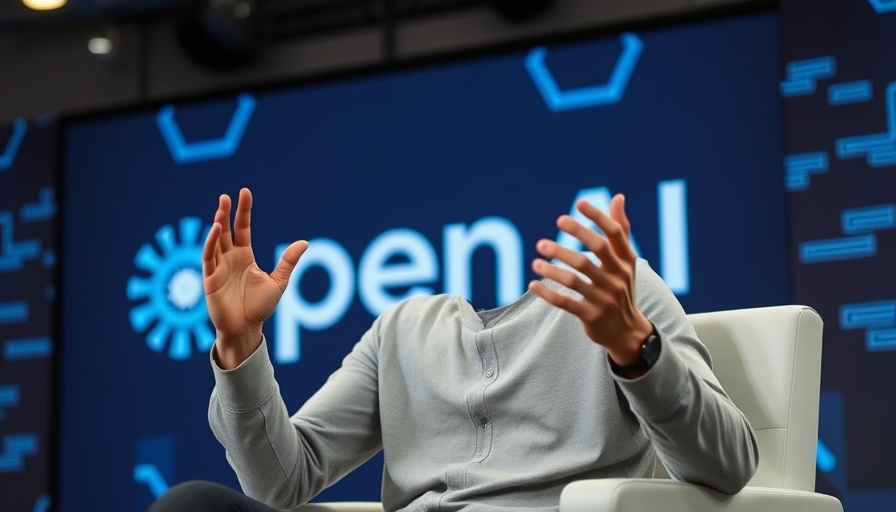
OpenAI Faces Off Against Meta in Talent Tug-of-War
The shifting dynamics of talent acquisition in Silicon Valley have taken a dramatic turn, particularly as Meta sets its sights on luring away top researchers from OpenAI. In an internal memo by Mark Chen, OpenAI's Chief Research Officer, the sentiments echoed a sense of urgency and protectionism akin to a home invasion. His metaphor, describing the recruitment as "someone has broken into our home and stolen something," illustrates the gravity with which OpenAI's leadership regards these departures. Competition in artificial intelligence (AI), already intense, has now escalated into a strategic battle fueled by sharks in the water.
The Stakes in AI Research
As recruitment becomes a battlefield, the stakes are higher than ever for organizations at the forefront of AI advancement. Firms like Meta are no longer merely competitors but are vying aggressively for the human capital that drives innovation. Chen mentioned the surge in offering hefty signing bonuses, some reaching up to $100 million, as part of Meta’s recruitment strategy, positioning it as a formidable threat to OpenAI's talent pool. This situation emphasizes the essential role of skilled researchers in shaping future technologies and underscores the lengths to which tech giants will go to secure their services.
OpenAI's Response: A Reflection of Culture and Leadership
In response to the aggressive recruiting tactics deployed by Meta, Chen promised a recalibration of compensation and a focus on creative ways to recognize top talent within OpenAI. This proactive stance is significant not only for retaining employees but also for shaping the work environment that encourages innovation. However, Chen's commitment to fairness and transparency adds a layer of complexity to the dilemma, reflecting a culture rooted in mutual respect while simultaneously navigating the fierce competition.
Future Predictions: AI Talent Wars Unfolding
This unfolding drama portends broader implications for the AI industry. With established players like Meta increasing their financial incentives, smaller organizations and startups might find themselves severely challenged in retaining their best talent. In light of such trends, one might speculate about how emerging companies can compete: innovative culture, work-life balance, and employee engagement will become non-negotiable factors for talent retention.
Insights on Employee Retention Strategies
In an age where competitive offers are spurring unprecedented company loyalty challenges, businesses need to rethink their employee retention strategies. Companies must not only match but exceed external offers by creating environments where creativity, inclusivity, and recognition are prioritized. Implementing practices such as mentorship programs, regular feedback mechanisms, and career development paths can also go a long way in enhancing employee satisfaction and loyalty.
Risk Factors: What Companies Must Watch For
The current scenario is emblematic of broader workforce trends across industries. The risk of talent attrition is increasing as personal preferences shift, particularly among tech-savvy millennials and Generation Z employees. Emotional well-being, company mission alignment, and job satisfaction increasingly influence career decisions. Companies ignoring these factors may find themselves bereft of their most valuable asset—their people.
Actions Companies Can Take Today
For organizations within the AI sector or those dealing with technological talent, it is imperative to take proactive measures. These may include benchmarking compensation packages competitively, creating clear pathways for employee growth, investing in diversity and inclusion programs, and engaging in open discussions about workplace culture. Ultimately, fostering a positive environment where employees feel valued can help mitigate the threat posed by aggressive recruitment.
In summary, as Meta continues its aggressive recruitment burst, OpenAI's fight to retain its talent presents a case study for long-term workforce strategy in the tech industry. Understanding and adapting to these evolving dynamics could define the future of AI development—and the company that innovatively attracts and retains talent may well shape the industry’s future.
The demand for top talent within the AI sector is only expected to grow. Now is the time for companies to evaluate their own strategies and enact changes that will not only attract but also retain skilled researchers in this competitive landscape.
 Add Row
Add Row  Add
Add 




Write A Comment